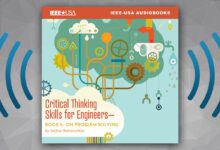
A city of the future “Sociecity;” engineered by students from West Ridge Middle School in Austin, Texas ” has won the grand prize at the 2017 Future City Competition ” the 25th anniversary of this prestigious international program. The students ” Hunter Samra, 14, Emma Tyler, 13 and Tiffany Samra, 11 ” teamed with teacher Carol Reese ;and volunteer mentor Nick Samra, an electrical engineer at TSMC in Austin ” to earn the 2017 Grand Prize. The Future City Finals, which concluded on 21 Febraury at the Capital Hilton in Washington, D.C., was one of the showcase events taking place during Engineers Week.
“It was a lot of work and a lot of research but it was also so much fun,” said Emma Tyler of the winning team. “We bonded as a team, we stayed together and we had a great time. I would recommend Future City to anyone. It was a once-in-a-lifetime experience.”
Since last fall, more than 40,000 middle school students from 1,350 schools in 37 U.S. regions, as well as teams from Canada, China and the Middle East, have been imagining, designing and building the cities of the future. Regional Finals were held across the country in January. This year’s theme, The Power of Public Space, encouraged students to design innovative, multi-use public spaces that serve a city’s diverse population.
West Ridge Middle School, part of the Texas (North) region, takes home the grand prize of a trip to U.S. Space Camp and $7,500 for its school’s STEM program (provided by Finals sponsor Bentley Systems, Inc.). Their city’s solution is based on the model the team researched, developed and presented.
Second place went to Veritas Homeschoolers from Gilbert, Arizona, for their Future City, Revivi Quito. The team of Madyison Nichols, 13, Jeremy Graunke, 13 and Adriana Baniecki, 13, teamed with teacher Kathryn Graunke and volunteer mentor Matthew Graunke, quality engineer at MTD Southwest in Tempe. Veritas Homeschoolers receives a $5,000 scholarship for its STEM program, sponsored by the National Society of Professional Engineers (NSPE).
Lionville Middle School, representing the Philadelphia region from Exton, Pennsylvania, took third place honors for its Future City, Kopiena. The students “Neehar Kolli, Riya Mitra and Paige Williams ” teamed with teacher Guy Raines and volunteer mentor Dan Koval. Lionville Middle School receives a $2,000 scholarship for its STEM program, sponsored by IEEE-USA.
Honorable mention for fourth place went to students from Warwick Middle School in Lititz, Pennsylvania from the Pennsylvania (Central) region for their city, Pompeii. Fifth place was awarded to students from Southwest Middle School from Lawrence, Kansas, in the Great Plains region for their city, Teratai. Each receives $750 for their organizations’ STEM programs, sponsored by Ohio University and NCEES (National Council of Examiners for Engineering and Surveying).
The Future City Competition empowers students in 6th, 7th and 8th grades to imagine, research, design and build cities of the future. Keeping the engineering design process and project management front and center, students are asked to address an authentic, real-world question: How can we make the world a better place?
During the Future City Competition, students work as a team to complete five deliverables. They design a virtual city using SimCity software. They research a city-wide issue and write an essay describing their findings and innovative solutions. Teams complete a project plan to help keep their project on track. And they also build a tabletop scale model of their city using recycled materials, and create a short presentation about their city.
One of the nation’s leading engineering education programs and among the most popular, Future City has received national recognition and acclaim for its role in encouraging middle schoolers to develop their interest in science, technology, engineering and math (STEM). In 2016, the Future City Competition received the 2016 Henry C. Turner Prize for Innovation in Construction, presented by Turner Construction Company and the National Building Museum.
In 2015, Future City was named the grand prize winner in the UL (Underwriters Laboratories Inc.) Innovative Education Award program, receiving a $100,000 award. The UL award highlights programs that use the Environment as a pathway to STEM learning (E->STEM).
Future City has ongoing opportunities for engineering and technical professionals to volunteer in a number of different roles, including mentors and regional coordinators. For information about Future City or to volunteer, visit www.futurecity.org.
Major funding for Future City comes from the Bechtel Corporation, Bentley Systems, Inc, Shell Oil Company, and DiscoverE.
As lead society for Engineers Week in 1993, IEEE-USA helped launch the very first Future City Competition as an engineering-design competition for middle school students. That year’s winners, students from Tilden Middle School of Rockville, Md., were invited to the White House to meet with then-President Bill Clinton and to show him their winning city, “Tilden Town.” During that inaugural event, about 175 students and 600 schools participated across five regions. Today, the Future City program serves more than 40,000 students annually throughout the United States and abroad.
About DiscoverE
DiscoverE is leading a growing volunteer movement that inspires and informs present and future generations to discover engineering. Our network of volunteers in the US and abroad is drawn from the DiscoverE coalition of more than 100 professional societies, major corporations and government agencies. Together we meet a vital need: introducing students, parents, and educators to engineering, engaging them in hands-on engineering experiences and making science and math relevant. For more information, visit www.discovere.org.
Leslie Collins is executive director of DiscoverE.






